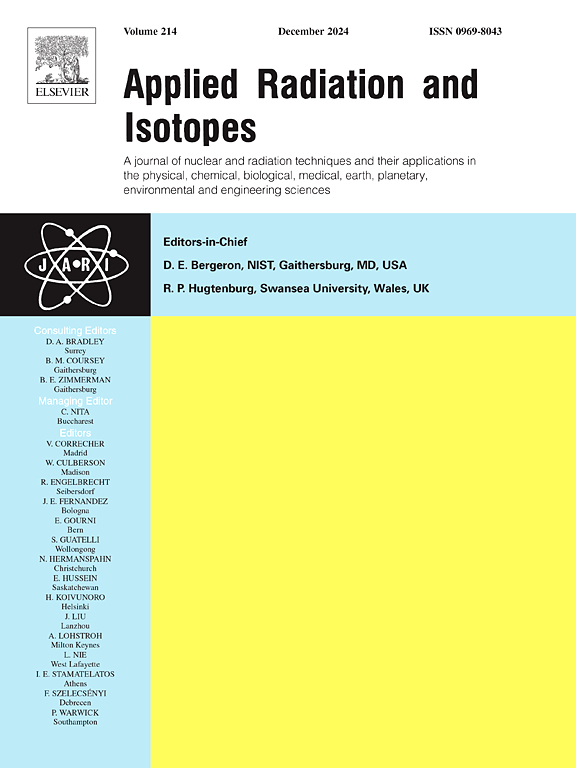Proton dose deposition in heterogeneous media: A TOPAS Monte Carlo simulation study
IF 1.6
3区 工程技术
Q3 CHEMISTRY, INORGANIC & NUCLEAR
引用次数: 0
Abstract
This study investigated the influence of tissue electron density on proton beam dose distribution using TOPAS Monte Carlo simulation. Heterogeneous tissue models composed of 14 materials were constructed to simulate the dose deposition process of a 169.23 MeV proton beam. The study analyzed the relationships between electron density and key parameters such as maximum dose, total dose, and dose distribution. Results showed that increasing electron density led to higher local maximum dose, lower total dose, and decreased Bragg peak depth, range, penumbra width, and full width at half maximum (FWHM). High-density tissues caused a sharp, concentrated Bragg peak at shallower depths, while low-density tissues caused a backward shift and widening of the Bragg peak. Differences in proton energy deposition in various tissues were the fundamental reasons for dose distribution variations. This study quantified the relationship between electron density and proton beam dose distribution, providing a reference for accurate dose calculation and optimization in proton therapy.
非均质介质中质子剂量沉积:TOPAS蒙特卡罗模拟研究。
利用TOPAS蒙特卡罗模拟研究了组织电子密度对质子束剂量分布的影响。建立了由14种材料组成的非均匀组织模型,模拟了169.23 MeV质子束的剂量沉积过程。研究分析了电子密度与最大剂量、总剂量、剂量分布等关键参数的关系。结果表明,电子密度增大导致局部最大剂量增大,总剂量减小,Bragg峰深度、范围、半影宽和半峰全宽减小。高密度组织在较浅的深度处形成一个尖锐、集中的Bragg峰,而低密度组织则导致Bragg峰向后移动和变宽。不同组织中质子能量沉积的差异是剂量分布变化的根本原因。本研究量化了电子密度与质子束剂量分布的关系,为质子治疗中剂量的精确计算和优化提供了参考。
本文章由计算机程序翻译,如有差异,请以英文原文为准。
求助全文
约1分钟内获得全文
求助全文
来源期刊

Applied Radiation and Isotopes
工程技术-核科学技术
CiteScore
3.00
自引率
12.50%
发文量
406
审稿时长
13.5 months
期刊介绍:
Applied Radiation and Isotopes provides a high quality medium for the publication of substantial, original and scientific and technological papers on the development and peaceful application of nuclear, radiation and radionuclide techniques in chemistry, physics, biochemistry, biology, medicine, security, engineering and in the earth, planetary and environmental sciences, all including dosimetry. Nuclear techniques are defined in the broadest sense and both experimental and theoretical papers are welcome. They include the development and use of α- and β-particles, X-rays and γ-rays, neutrons and other nuclear particles and radiations from all sources, including radionuclides, synchrotron sources, cyclotrons and reactors and from the natural environment.
The journal aims to publish papers with significance to an international audience, containing substantial novelty and scientific impact. The Editors reserve the rights to reject, with or without external review, papers that do not meet these criteria.
Papers dealing with radiation processing, i.e., where radiation is used to bring about a biological, chemical or physical change in a material, should be directed to our sister journal Radiation Physics and Chemistry.
 求助内容:
求助内容: 应助结果提醒方式:
应助结果提醒方式:


